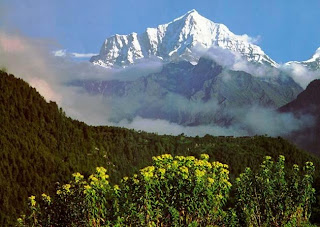Tibet presents one very special ecosystem with unique biodiversity and has tremendous ecological and environmental importance, especially since environmental conditions in Tibet have major effects in neighboring countries, such as India, China, Bangladesh and Pakistan.
Tibet is facing many environmental problems and although China issued in 2003 so called "White Paper" about ecological improvement and environmental protection in Tibet, there is still lot of problems that need to be solved if China plans to preserve this unique piece of nature.
Tibet ancient forests have long history of deforestation, and they were reduced to the half of the area in less than 40 years (1950-1990), mainly because of the new roads. As the new roads move further, so does the rate of deforestation increase, and China is planning even more road projects across the whole Tibet. Deforestation isn't only happening because of the roads, but also because of the valuable timber. This deforestation is particularly dangerous from ecological point of view since forests have great influence on creating the wind patterns and the general weather conditions.
Tibet like many other areas in the world is also seriously affected with problem of global warming as Tibetan glaciers are melting at rapid rate of 7 % annually, all because of the global warming and climate change as average temperatures in Tibet increased by almost 1 degree Celsius since the 80s. If this trend continues it will cause drought, more desertification and cause many sandstorms that have already showed their vicious face in China.
Wild life in Tibet is also in jeopardy, mainly because of habitat lose and poaching, and many of these animals have already become extinct, especially in period of excessive deforestation that lasted for almost 40 years. Some reports even say how many animals are being killed by Chinese soldiers just for fun and sport who are even using automatic weapons in doing this. Laws about restricted hunting are mostly just letters on the paper as there are many illegal hunting tours organized for rich clients that often hunt endangered species such as Tibetan antelope and the Argali Sheep.
What many of people don't know is the fact that Tibet environmental condition affects entire planet. One independent research showed how Tibet's environmental condition affects 85 percent of Asia's population and over 47 percent of the world inhabitants, which means that Tibet is not just regional problem.
Sadly, mainly because of the global warming and climate change, there are literally no such things as regional ecological problems. Every ecological problem now presents global threat to our planet and Tibet is no exception.

No comments:
Post a Comment